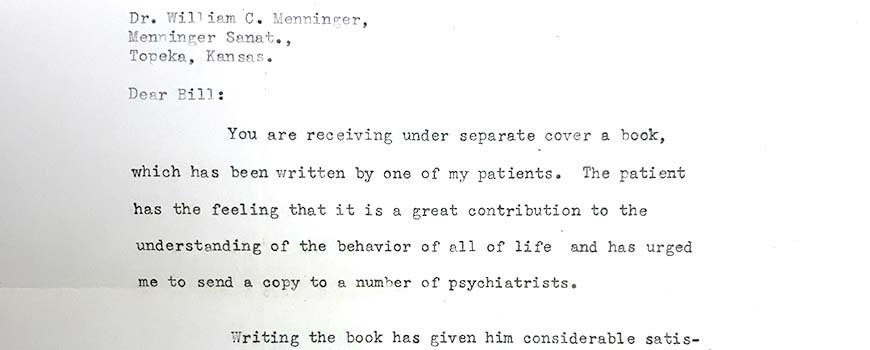by Kelsey Koym
Archives Intern

The Menninger collection contains hundreds of books spanning the various periods of psychological history and its specialties. Although the idealization of Freud and his near idol-like status saturate many of the pages of these books, unique items will stand out written by the patients of these medical professionals. One of these has greatly intrigued me, and it is worth the time to give it publicity.
The book is titled, “I Question,” and it is written by an anonymous author. At first this book seemed inconsequential. It consists of only eighty-two pages and has a foreword written by a Dr. Frank H. Luton, who grants a seemingly sincere recommendation to readers about the book’s value. There is no table of contents, and it lacks an index. What it does contain, however, is a piece of evidence of the book’s origination. In the back is a letter from Dr. Luton to Dr. William Menninger, brother to Dr. Karl Menninger whose name is formally attached to the collection. The letter is dated March, 20, 1947, and reveals that the anonymous author is one of Dr. Luton’s patients. Luton (1947) writes, “Writing the book has given him considerable satisfaction and I believe has enabled us to avoid institutionalization.” I needed to investigate more.
The book went to Phase Two of the appraisal process, which means the book needed to be checked against WorldCat to determine whether other facilities had the item. WorldCat listed six libraries that house this work, and now McGovern Historical Center makes seven. Mystery of authorship intrigues its audience, and it builds user’s curiosity enough to explore a book’s pages. We are closer to understanding this work’s origins because of a single letter pasted to a book that has been seemingly forgotten.
In the book, “Anonymous” consistently mentions the “other world.” His narrative skips, and its stop-and-go introspection reveals a mind that is reflecting upon its psychiatric history and the emotions accompanying it. The author speaks with authority regarding the voices he hears from this other world, and a reader cannot help but sense the whispers of a troubled mind.
The Menninger collection has books for the practicing doctor with a focus on the profession’s evolution and its historical context. However, there are works divulging the intimate stories of those patients who have undergone evaluation and treatment. Their journeys have been recorded and preserved to illuminate the experiences of the mentally ill and their healing.
